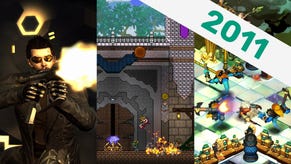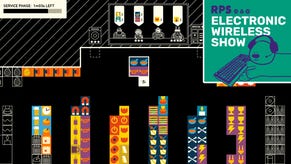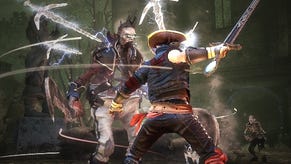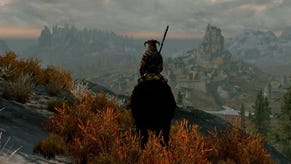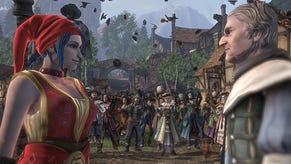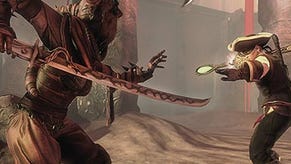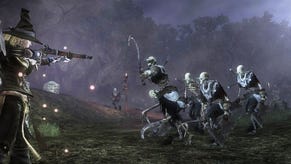Develop 10: Molyneux On Fable III
The Fable 3 demonstration starts a little late, due to Peter Molyneux being a little too reliant on his SatNav. Which is the sort of thing which strikes me as a workable critique of the “bread-crumb” hand-holding in Fable 2, but we're probably denying the existence of that non-PC Game. Which is going to make writing about the first public European showing of Fable III, it brings directly to mind its direct prequel.
The key idea which sticks out on the slides is trying to make Fable III more like an action-adventure than a techie-RPG, leading to an ever-expanding audience. In other words, gaming populism. As ever, Molyneux has some interesting approaches to that – and while my Fable 2 comparison was a little facetious, it's a game which could profit from a second iteration. Molyneux admits to a lack of polish, telling the story of how with its 67,000 bugs pre-release lead to Microsoft quality team ended up rating it as Super-Black. No-one had even been plain old black before, which brings to mind Walker's anecdote about people who get “N” grade at A-level. That there's two sorts of people – those who don't know that N-grade exists and those who receive them.
In other words, strimming down of the ambition towards release to make it – y'know – work was a key theme in the last months of Fable II.
So where to take it now? Looking at player data they realised there were enormous numbers of features which players didn't ever use, or just use once (like getting married, which Molyneux didn't add anything to the game and was an excuse to have sex. Though I quite like any excuse to have sex). More than 50% of the people who played Fable only understood 60% of the features. They're planning a slower introduction of the full levels of powers to that end – and watching players who haven't tried various activities for a long time to re-suggest or re-introduce you to the idea.
One area of improvements which is oddly skimmed over is that they felt they didn't take the drama seriously enough. Molyneux felt most people didn't really understand what was going on in Fable II, so they're trying to create something which can actually move people. They're doing this with better voice-actors - he compares the one person doing 300 voices of Black & White with the cast for Fable III which includes John Cleese, Bernard Hill, Stephen Fry and Zoe Wanamaker and MORE OSCAR WINNING TALENT. Hopefully actors, rather than people who win best costume making or something. Otherwise, the main drama reveal was how the game would be shaped around a simple idea – leading a rebellion against a tyrant, to become king. I've always been a strong advocate of this kind of concept for game plots – game plots are primarily motivation for more mechanics-styled games – so I'd like to hear more about what they're doing.
Some of the details are interesting, however. For example, on the way to take the crown, when recruiting folk, you can make promises about what you'll do when you get that crown. For example, turning a factory into a school. However, you don't have to do them, which the obvious results. Molyneux also demonstrates dragging someone around and getting them drunk to be your friend, which is actually a fair simulation of most of my life. Oh – and people will respond more to what you wear. The example used is that wearing a chicken costume to get crowned will garner commentary. Quite.
Towards the accessibility aspect, they're losing a menu-based inventory in favour of an actual sanctuary you teleport to. Press a button, you zap to a room full of – say – your costumes, and you run up to what you want to wear. A key art was making sure this more decorative system actually takes the same or less time as a traditional menu based system – which is the right route to take, but one which I'm only going to believe when I actually play the game.
The traditional tropes of the role-playing are re-imagined in the form of the Guild Seals – the single currency in the game which you collect and spend on everything, which is presented to you in the form of chests. So the ability to level up your fighting prowess or – say – buy a fancy house are bought with this same resource. The fighting prowess is also implanted with your weapons rather than the character. For example, powering up your gauntlet will give you new special abilities. However, since the weapons are tied to your character, morphing in effect depending on your choices, so it's effectively a similar system.
Combat and Co-op seem refined from the previous version too – Molyneux seems especially pleased that you're able to flirt, romance and marry your co-op partner. “Why can't we have an intimate moment when playing Fable 3?” he wonders, which reminds me of my regular masturbation breaks when playing Darkfall, which probably wasn't the idea. Combat's infinite power-up are also cute, so the charge abilities – where you hold down a button to get increasing zap – has no top. Keep a button pressed overnight for a hyperblast, if you wish.
The dog's also back. Can you have an intimate moment with the dog, Peter? Dare you. Double-dare you.



